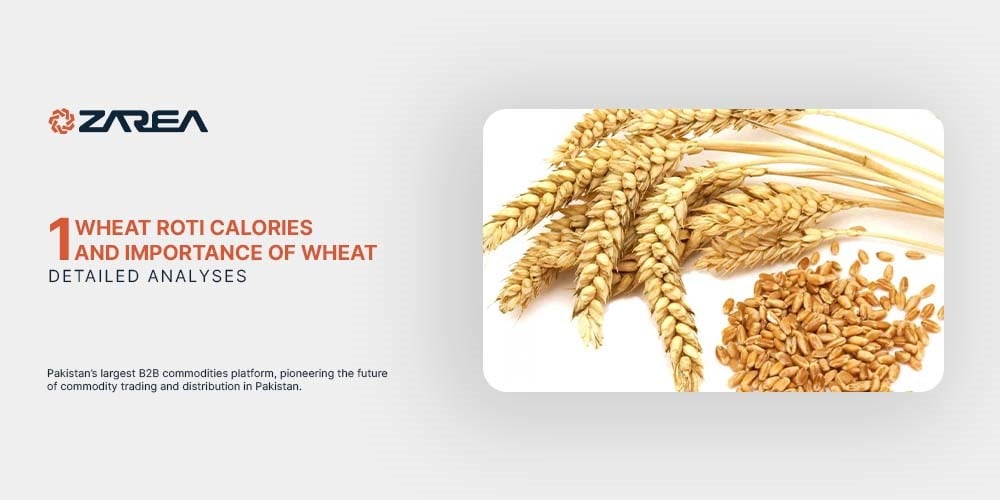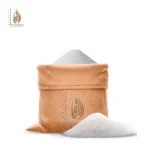Nutritional Value and Importance of Wheat:
Importance of wheat: It is one of the most widely eaten grains around the world. Wheat also known for its rich nutrient supply and related health benefits. It serves as a usefull source of energy, dietary fiber and essential nutrients for a healthy life. It positions itself as a key element in many eating habits. On the other hand it also offers as a key element of the nutritional composition of wheat, and its crucial role in maintaining a healthy diet too. Although wheat plays a key vital role as an agricultural product. There is no doubt that it will be essential for maintaining the food security of the growing population of Pakistan in the upcoming years.
So today, wheat is the most widely grown crop in Pakistan. Zarea helps in technological and B2B improvements which are advancing wheat supply chain techniques across the country so far. The food sector is an essential asset to creating a nutritional base. As it is also developing innovative sustainable food options too.
Macronutrients in Wheat
Carbohydrates (71–75%)
- Wheat is basically made up of complex carbohydrates. It acts as a source of sustained energy which is required for a healthy life.
- Its moderate glycemic index (GI) makes it suitable for ensuring consistent energy release. Also it regulates blood sugar levels.
Proteins (12–14%)
- Wheat contains gluten, a kind of protein that enhances the baking process through its elasticity.
- Moreover, it acts as a beneficial source of plant-derived protein. Which supports muscle growth and recovery.
Fats (1–2%)
- Wheat naturally contains low fat levels in it. Which makes it a good option for promoting heart health.
- It also contains beneficial unsaturated fats that boost cellular activity in the human body.
Dietary Fiber (10–15%)
- Dietary fiber present in whole wheat is very essential for stomach health. Which also promotes digestion, improves gut health, and assists with weight management.
- Fiber is important for managing cholesterol and blood sugar levels. Which helps to reduce the risk of developing diabetes and heart disease.
Essential Vitamins in Wheat:
- B Vitamins (B1, B2, B3, B6, Folate) – It helps in metabolic activities and supports cognitive abilities. It plays a role in red blood cell production also.
- Vitamin E – It acts as a powerful antioxidant and protects cells from harm.
- Vitamin K – It protects against blood clotting and promotes bone health.
Essential Minerals in Wheat:
- Iron – It helps carry oxygen throughout the bloodstream. It also assists in preventing anemia.
- Magnesium – It is essential for the effective operation of nerves. It also aids in muscle relaxation and ensures bone health.
- Zinc – It boosts the immune system response and aids in wound healing.
- Phosphorus – It plays a vital role in the growth and upkeep of strong bones and teeth.
- Selenium – It acts as an antioxidant and protects cells from oxidative harm.
Whole Wheat vs. Refined Wheat:
| Nutrient | Whole Wheat | Refined Wheat (White Flour) |
|---|---|---|
| Fiber | High | Low |
| Vitamins & Minerals | Rich in B vitamins, iron, and magnesium | Most nutrients lost during processing |
| Protein | Moderate | Lower |
| Energy Release | Sustained | Quick spike and crash |
Note: Another importance of wheat is considered as it’s more nutritious. As it retains the bran, germ, and endosperm. While refined wheat processes and leads to a loss of essential nutrients.
Health Benefits of Wheat:
- Supports Digestive Well-being – The abundant fiber helps in maintaining a healthy digestive system and prevents constipation.
- Boosts Energy Levels – Wheat has complex carbohydrates which provide more energy for daily life activities.
- Aids Cardiovascular Well-Being – Wheat lowers cholesterol levels and helps regulate blood pressure.
- Aids in Weight Management – Fiber present in wheat boosts the sensation of fullness and also reduces hunger cravings.
- Boosts Mental Performance – B vitamins in wheat promote brain function and sharpness.
1 Wheat Roti Calories and Health Benefits: Weight Management, Digestion, and Energy:
Although wheat roti is an important part of many homes, Yet it is acknowledged for its nutritional value and health benefits. It is made with whole wheat flour, and provides important nutrients like fiber, protein, and complex carbohydrates. Which makes it a healthier choice compared to other items made from refined flour. This blog highlights the advantages of wheat rotis in order to promote weight control, digestive health, and energy balance. Rotis are a pure and important source of carbohydrates, fats, and proteins. One roti weighs 100 grams which offers various nutritional details as given below.
In 100 grams of roti, you can find roughly 300 calories. The nutritional values of a roti are given as follows:
- Carbohydrates make up approximately 62%
- Proteins make up 11%
- Fats constitute 28%
Carbohydrates:
Roti has 46.13 grams of carbs for every 100 grams. A roti of medium size, weighing 40 grams, contains roughly 18.5 grams of carbohydrates, translating to around 68 calories.
Fats:
Roti or chapati contains about 9.2 grams of fat for every 100 grams. A medium-sized roti, with a weight of 40 grams, has around 3.7 grams of fat and provides roughly 33 calories.
Proteins:
A 100-gram portion of roti contains 7.85 grams of protein. As a result, eating 40 grams of chapati will provide nearly 3.1 grams of protein, adding about 12 calories to your intake.
Weight Management:
Wheat roti is an ideal part of a balanced diet for those looking to maintain or lose weight.
- Low in Calories – A medium-sized wheat roti (30g) generally has around 70–120 calories, making it a lighter-calorie option compared to white bread or parathas.
- Importance of Wheat Roti – Rich in Fiber – Whole wheat roti is rich in dietary fiber, which encourages lasting fullness. Thus it’s reducing the chances of excessive snacking and overeating.
- Low Glycemic Index (GI) – Whole wheat roti has a moderate GI, aiding in the prevention of sudden spikes in blood sugar levels, which in turn supports fat loss and appetite control
Note: Merge the calories from 1 wheat roti with protein-rich foods (like dal, paneer, or lean meats) and healthy fats (such as ghee or avocado) to boost satiety and aid metabolic function.
Supports Healthy Digestion:
Effective digestion is vital for general health, and wheat roti plays a key role in sustaining a healthy digestive system.
- Rich in Fiber – The insoluble fiber present in whole wheat promotes regular bowel movements, aiding in the prevention of constipation and discomfort.
- Importance of Wheat Roti in Gut Health – Fiber acts as sustenance for helpful gut bacteria, promoting a healthy microbiome and reducing digestive problems.
- Easier to Digest than Refined Flour – Unlike white bread or items made with refined flour, wheat roti is digested slowly, enhancing fullness and reducing acid reflux symptoms.
Note: Make sure to stay well-hydrated and include foods high in probiotics (like yogurt and fermented veggies) to enhance digestive health.
Provides Long-Lasting Energy:
Wheat roti provides a great source of long-lasting energy due to its complex carbohydrates.
- Importance of Wheat in Steady Energy Release – Unlike refined carbs, whole wheat releases glucose slowly, providing lasting energy without abrupt fluctuations.
- Rich in B Vitamins – Whole wheat is a good source of B vitamins (B1, B3, B6, and folate), crucial for energy metabolism and brain function.
- Great Source of Iron and Magnesium – These vital minerals aid in oxygen transport and enhance muscle function, making wheat roti an ideal option for individuals with active lifestyles
Note: Combine wheat roti with iron-rich items like spinach, lentils, or eggs to improve nutrient absorption and increase energy levels.
Final Thoughts:
Wheat is a nutrient-dense grain. As it provides essential carbohydrates, proteins, fiber, vitamins, and minerals to the body. So, by choosing whole wheat over refined wheat, you can boost your health benefits gradually.
Add whole wheat roti to your meals and support weight control significantly. As it improves digestion and offers long-lasting energy. While its nutrient-dense composition renders it a valuable and multipurpose food choice for daily meals.
For best results:
- Choose whole grain flour rather than refined flour.
- Blend with protein sources and beneficial fats.
- Maintain proper hydration and sustain a well-rounded diet.
FAQ’s:
What was the importance of wheat?
Wheat is rich in various minerals. The levels of minerals in wheat are influenced by the variety, soil composition, climate conditions, and farming methods, including organic agriculture. Whole wheat flour contains more vitamins and minerals compared to white flour.
What are the benefits of eating wheat?
Besides being a key source of starch and energy, wheat also offers significant quantities of various components that are either essential or advantageous for health, especially protein, vitamins (particularly B vitamins), dietary fiber, and phytochemicals.
What is the importance of wheat crop in Pakistan?
Wheat is a fundamental food crop in Pakistan, leading all crops in both area and output. Wheat represents 37.1% of the cultivated area, 65% of the food grain land, and 70% of the overall output. Primarily cultivated in irrigated environments, wheat’s water needs vary between 20-21 inches per acre.
How many calories are in 1 whole wheat roti?
When discussing weight loss, many dieticians and nutritionists recommend that we replace rice with whole wheat chapati or roti. Understanding the caloric content of a roti can aid in highlighting its nutritional features. A medium roti weighing around 40 g contains 120 calories.
Is wheat roti good for fat loss?
The advantages of consuming roti for weight loss, in contrast to rice, include: Reduced Calorie Consumption: Roti typically has fewer calories than an equal portion of white rice, making it a suitable option for individuals aiming to manage their calorie consumption.

































